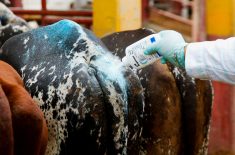Washington/Chicago | Reuters — U.S. President Donald Trump said on Tuesday the United States should consider terminating trade deals under which it imports cattle as he looks to help U.S. ranchers hit hard by the coronavirus outbreak.
The United States imports cattle from Mexico and Canada to supplement domestic supplies at lower prices and to slaughter in American plants run by companies such as Tyson Foods and JBS USA. Bans could reignite trade disputes.
“I read yesterday where we take some cattle in from other countries. We have trade deals. I think you should look at terminating those deals,” Trump said. “We have a lot of cattle in this country.”
Read Also

U.S. grains: Soy futures post biggest monthly gain in nearly five years on China trade optimism
U.S. soybean futures climbed to a 15-month high and posted their biggest monthly gain in nearly five years on Friday following a rally fueled by the prospect of revived exports to China.
Trump made the comments at a White House event held to discuss $19 billion in agricultural relief approved by Congress. He did not mention specific trade deals or countries when talking about cattle.
Live cattle imports come only from Mexico and Canada and are allowed under the terms of Trump’s newly renegotiated North American trade pact.
“If a country’s been a great country and a great ally and a great friend, you know, we have to do that, but there are some countries that are sending us cattle, for many years, and I think we should look at terminating,” Trump said.
Asked later in the same event about the subject, he said, “I’m saying, why are we bringing in cattle, old trade deals that were made a long time ago, why are we bringing in cattle from other countries when we have so much ourselves?”
In “some cases,” he said, without naming any countries, “they’ve been great allies, they’ve been working with us for many years, sometimes we needed the cattle, sometimes we don’t…. Generally speaking, unless this is a country that has been with us, we shouldn’t be taking their cattle.”
“It was something I wish the president hadn’t said,” U.S. National Cattlemen’s Beef Association president Marty Smith, who attended the event, said later. He added the suggestion may have resulted from a misunderstanding.
Oswaldo Chazaro, head of Mexican cattle confederation CNOG, said that while he respected Trump’s opinion, many years had been spent developing an integrated beef market in which all consumers benefit.
“More thought should be given to keeping this healthy, balanced trade in both directions,” said Chazaro.
A potential ban could increase competition for U.S. beef exports if Mexico and Canada keep more cattle at home and process them, said Derrell Peel, livestock marketing specialist at Oklahoma State University.
“Obviously, if we just ban Mexican and Canadian cattle, they’re not going to take that kindly,” Peel said.
According to the U.S. Department of Agriculture, Canada exported over 722,000 head of cattle to the U.S. in 2019, up almost 15 per cent from 2018. In the first quarter of 2020, Canada shipped 184,483 cattle to the U.S., down about eight per cent from the year-earlier period.
Mexico’s beef industry, meanwhile, expects its exports to the U.S. to grow by double digits this year after the pandemic hobbled U.S. meat plants. USDA’s data puts Mexico’s 2019 cattle exports to the U.S. at about 1.32 million head, and its 2020 first-quarter exports at 345,713 head.
Last year, Mexico was the third-biggest foreign beef supplier to the United States, behind Australia and Canada.
The Canadian Cattlemen’s Association on Tuesday described U.S.-Canada beef trade as both “integral” and “mutually beneficial” in a statement posted on its website.
Asked at the same event Tuesday about an extension for the ban on non-essential travel between the U.S. and Canada, Trump described Prime Minister Justin Trudeau as “a friend of ours” and added “we’re very close to Canada; we just signed the USMCA, which is a big deal.”
Separately, U.S. Agriculture Secretary Sonny Perdue said Tuesday the Trump administration would provide aid to U.S. ranchers who had been forced to euthanize livestock.
— Reporting for Reuters by Steve Holland in Washington and Tom Polansek in Chicago; additional reporting by David Alire Garcia in Mexico City, David Ljunggren and Kelsey Johnson in Ottawa; writing by Doina Chiacu and Tom Polansek. Includes files from Glacier FarmMedia Network staff.











